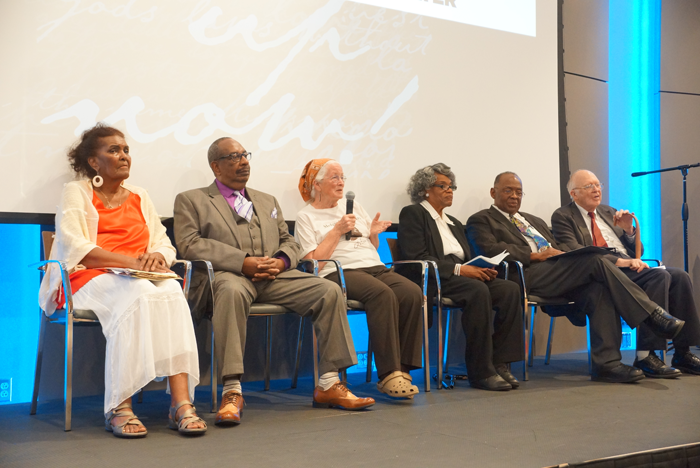
By Cianna Hope Reeves,
JSU Student Intern,

As news began to spread rapidly about the assassination of Medgar Wiley Evers, a prolific and profound civil rights leader in Mississippi, June 12, 1963, the black community was brought to its knees. The devastation would have a lasting impact.
Because of Evers’ unforgettable fight to attain justice, his legacy still lingers more than five decades later.
Fifty-five years to the date of his death, citizens across the state of Mississippi gathered to commemorate and reflect on the heritage of Evers in Jackson at the recently opened Civil Rights Museum.
The program included special and memorable performances by MADDRAMA Performance Troupe, singers DeAnna Tisdale Johnson and Pam Confer, spoken word poetry by Leigh McInnis, and ended with a panel discussion of Evers’ former colleagues and acquaintances who reflected on past encounters with the legend.
Evers’ daughter, Reena Evers-Everette, recalled the influence her father had on many others and shared her personal experience of him as a father and the indelible impact he had on her and the entire family.
“We are here celebrating a person that is so dear to me because his blood runs through my blood. A person that has touched so many of us whether we knew him personally, whether we worked with him, broke bread with him or just honored him – that is my daddy, Medgar Wiley Evers,” expressed Evers-Everette.
As she continues sharing the legacy of her father, Evers-Everette said she is amazed by those who have worked to transform Mississippi just as he strived to do.
“Each and every day I am awed by him. Each and every day, I am awed by the warriors in this state, some we know about and others we learn about,” she proclaimed.
Moderator Michael Vinson Williams, who is also the author of the book, Medgar Evers: Mississippi Martyr and director of the African American Studies program at the University of Texas El Paso, said it is pivotal that individuals are exposed to the works of Evers.
“Medgar Wiley Evers dedicated his life to fight for the right and privileges of the least served by society, and he chose to carry that fight out here in Mississippi. He actually felt and internalized civil rights activism more than many people at that time understood and what people understand today, and that’s what I want people to realize,” said Williams.
To better understand his humanity and his dedication to advocate for the equality of others, those who knew and worked with him, offered insight to those in attendance as a means to become closer to a man who fought daily for freedom not just for his family but all families struggling to live in a racially divided country.
Robert Smith, a physician in Jackson during the Civil Rights Movement who treated the injuries of many activists during the height of the movement, referred to Evers as a proud African American.
“He was a person who loved Mississippi and who loved his country as much or more than anyone. He also created an awareness for all of us on how our country had failed in terms of our rights to vote, the ability to have healthcare and the ability to be educated… it was Medgar who emphasized that to us,” said Smith.
Murlene Terry Taylor, Evers’ secretary during his tenure as the NAACP state field secretary, called him a family man, and a memory that she will always remember about the icon is his willingness to help her family.
“My mother and father tried to register to vote many times and was turned away, but he made it possible for them to register to vote…Thank you God for our gentleman; he certainly had an impact on my life,” said Taylor.
In order to continue the legacy of Evers, Chris Cockrell, Evers’ great nephew, believes it can only advance through love and respect for one another.
“The main thing we have to do is love one another, to not feel like you are better than anyone. He died for equality, not just for blacks but for everybody,” expressed Cockrell.
President of the Mississippi State Conference National Association for the Advancement of Colored People (NAACP) Charles Hampton stated Evers – who was the former the field secretary of the NAACP for the state of Mississippi – would be happy yet filled with disappointment if he could watch the occurrences in the world today.
“I think he would go through a happy period if he could look down on us and see that we were making progress, and we were changing how things were going in Mississippi and in America. However, I think if he looked down on us now, he would be sad because we have become complacent, our young men are going to prison, our healthcare is bad and poverty is rampant in Mississippi still,” said Hampton.
In a society where change is everlasting, Hampton encourages citizens to unite and be the model of change.
“If we are going to make a change, we have to get involved, and we have to continue the fight that Medgar Evers started,” declared Hampton.

Be the first to comment